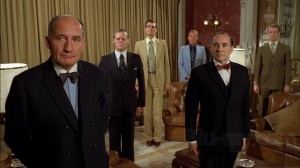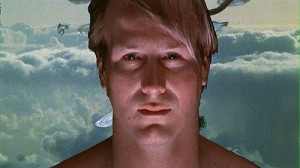When They Shouldn’t Have Bothered
 The movie version of The Boys From Brazil, based on Ira Levin’s (Rosemary’s Baby, The Stepford Wives) novel is about Hitler’s doctor Joseph Mengele, trying, via an extremely complicated process, to bring about a second coming. While the story is very clever, and the plan was very detailed and intelligent, it was so convoluted and involved, that actors like Gregory Peck, Laurence Olivier and James Mason had no opportunity to develop their characters, because they have to spend the entire time laying out each section of the plot and Mengele’s plan. When Denholm Elliott, as a chief of police begrudgingly helping aged Nazi-hunter Olivier, yells at Laurence and tells him to “stop lecturing,” it is the funniest moment in the movie, since the rest of the film requires a constant lecture. It is a film of constant exposition, throwing far too much into 2 hours and not helped by director Franklin J. Schaffner’s refusal to pick a tone, whether it be comedic or horrific.
The movie version of The Boys From Brazil, based on Ira Levin’s (Rosemary’s Baby, The Stepford Wives) novel is about Hitler’s doctor Joseph Mengele, trying, via an extremely complicated process, to bring about a second coming. While the story is very clever, and the plan was very detailed and intelligent, it was so convoluted and involved, that actors like Gregory Peck, Laurence Olivier and James Mason had no opportunity to develop their characters, because they have to spend the entire time laying out each section of the plot and Mengele’s plan. When Denholm Elliott, as a chief of police begrudgingly helping aged Nazi-hunter Olivier, yells at Laurence and tells him to “stop lecturing,” it is the funniest moment in the movie, since the rest of the film requires a constant lecture. It is a film of constant exposition, throwing far too much into 2 hours and not helped by director Franklin J. Schaffner’s refusal to pick a tone, whether it be comedic or horrific.
Seeing as a lot of his films do go over 2 1/2 hours, such as Patton, Papillion, Nicholas and Alexandra, etc., I wondered why he kept it to this extremely tight length. It makes it so there is no possible replay value for the movie, because there is no breathing room for anything, no acting moments to savor, no more than one or two lines of dialogue that are outside plot advancement. Obviously, if the movie were made today, they wouldn’t have to bother explaining all of the cloning details. But, considering the era it was written in, it appears that this is the kind of book that you couldn’t adapt without this issue and still keep it to a feasible film length. So perhaps there was far too much plot to be faithful and give the audience an entertaining adaptation.
Sometimes, if they leave enough of a massive story out, but still get the important portions, and the heart of the piece, like LA Confidential, the film can still be thrilling or entertaining. But, some adaptations were too story and plot heavy to the point where they shouldn’t have bothered even trying.
 Suffering this same exact problem is Ken Russell’s Altered States, an adaptation of Paddy Chayefsky’s novel and screenplay. When I say adaptation of his screenplay, I mean that apparently, it was written into Chayefsky’s script, since he had so much clout at the time following Network, that none of the lines could be changed. Russell (The Devils, Lisztomania, Lair of the White Worm) happy to finally have a studio budget behind him, but not happy to be controlled in that way, as he was used to having his freedom in his independence, directed the actors to only say their lines while eating, mumbling, or sped up so fast that they were barely intelligible. This wreaked havoc on the all the scientific details inherent in Chayefsky’s novel about the search for our genetic creation while using mushrooms and/or sensory deprivation tanks. It renders all of dialogue as nonsense mumbo jumbo, as if it was a big budget disaster movie and the nerdy character was giving the barely plausible exposition to justify whatever calamity the characters are focused on. What remains is an interesting battle of Russell’s focus on special effects left over from 2001, his typical surreal religious imagery, and all sorts of irresponsible decadence, including a totally random and hilarious sequence where William Hurt, having transformed into some sort of ape, runs around a zoo and eventually devours a sheep (though this probably inspired a similar scene in An American Werewolf in London, released a year later), versus Chayefsky’s attempt at an exploration of a man trying to discover meaning in the universe versus his own family/environment.
Suffering this same exact problem is Ken Russell’s Altered States, an adaptation of Paddy Chayefsky’s novel and screenplay. When I say adaptation of his screenplay, I mean that apparently, it was written into Chayefsky’s script, since he had so much clout at the time following Network, that none of the lines could be changed. Russell (The Devils, Lisztomania, Lair of the White Worm) happy to finally have a studio budget behind him, but not happy to be controlled in that way, as he was used to having his freedom in his independence, directed the actors to only say their lines while eating, mumbling, or sped up so fast that they were barely intelligible. This wreaked havoc on the all the scientific details inherent in Chayefsky’s novel about the search for our genetic creation while using mushrooms and/or sensory deprivation tanks. It renders all of dialogue as nonsense mumbo jumbo, as if it was a big budget disaster movie and the nerdy character was giving the barely plausible exposition to justify whatever calamity the characters are focused on. What remains is an interesting battle of Russell’s focus on special effects left over from 2001, his typical surreal religious imagery, and all sorts of irresponsible decadence, including a totally random and hilarious sequence where William Hurt, having transformed into some sort of ape, runs around a zoo and eventually devours a sheep (though this probably inspired a similar scene in An American Werewolf in London, released a year later), versus Chayefsky’s attempt at an exploration of a man trying to discover meaning in the universe versus his own family/environment.
The result is quite the mess, not satisfying in either direction, and far more ambitious than a 100 minute movie could handle. It explains the confused timeline, the characters repeatedly tell us how long it has been since the last scene. It is never clear if it’s 5 years or 5 minutes later.
Chayefsky disowned the film, his last involvement in a project before his death, apparently because he no longer had the energy to fight with studio heads, and Russell was banished to independent financing once again.
What needed more development is only hinted at in the film (a similar problem hits Steven Spielberg’s Close Encounters of the Third Kind, which also features Bob Balaban), is that Hurt is willing to give up his wife and children for some abstract discovery, and he expects them to understand without explaining it to them. Both Teri Garr in CE3K and Blair Brown in Altered States are understanding to a point, but are rightfully concerned with their husband’s safety and sanity. Hurt appears to be excused by the script because Brown knew in advance he was a little flaky and crazy, though it’s a nice touch that we see Hurt sleeping with a co-ed late in the film, instead of portraying him as a martyr/saint/explorer. In CE3K, Richard Dreyfuss (who Balaban heavily resembles in Altered States), has no justification for his actions, and it’s beyond irresponsible for him to leave them on a whim.



